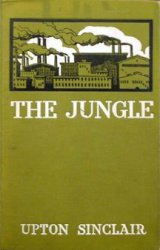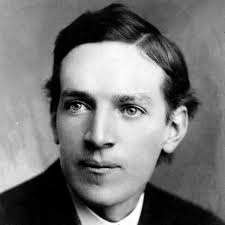The Jungle Page #9
The Jungle is a 1906 novel by the American journalist and novelist Upton Sinclair. Sinclair wrote the novel to portray the harsh conditions and exploited lives of immigrants in the United States in Chicago and similar industrialized cities.
A full hour before the party reached the city they had begun to note the perplexing changes in the atmosphere. It grew darker all the time, and upon the earth the grass seemed to grow less green. Every minute, as the train sped on, the colors of things became dingier; the fields were grown parched and yellow, the landscape hideous and bare. And along with the thickening smoke they began to notice another circumstance, a strange, pungent odor. They were not sure that it was unpleasant, this odor; some might have called it sickening, but their taste in odors was not developed, and they were only sure that it was curious. Now, sitting in the trolley car, they realized that they were on their way to the home of it--that they had traveled all the way from Lithuania to it. It was now no longer something far off and faint, that you caught in whiffs; you could literally taste it, as well as smell it--you could take hold of it, almost, and examine it at your leisure. They were divided in their opinions about it. It was an elemental odor, raw and crude; it was rich, almost rancid, sensual, and strong. There were some who drank it in as if it were an intoxicant; there were others who put their handkerchiefs to their faces. The new emigrants were still tasting it, lost in wonder, when suddenly the car came to a halt, and the door was flung open, and a voice shouted--“Stockyards!” They were left standing upon the corner, staring; down a side street there were two rows of brick houses, and between them a vista: half a dozen chimneys, tall as the tallest of buildings, touching the very sky--and leaping from them half a dozen columns of smoke, thick, oily, and black as night. It might have come from the center of the world, this smoke, where the fires of the ages still smolder. It came as if self-impelled, driving all before it, a perpetual explosion. It was inexhaustible; one stared, waiting to see it stop, but still the great streams rolled out. They spread in vast clouds overhead, writhing, curling; then, uniting in one giant river, they streamed away down the sky, stretching a black pall as far as the eye could reach. Then the party became aware of another strange thing. This, too, like the color, was a thing elemental; it was a sound, a sound made up of ten thousand little sounds. You scarcely noticed it at first--it sunk into your consciousness, a vague disturbance, a trouble. It was like the murmuring of the bees in the spring, the whisperings of the forest; it suggested endless activity, the rumblings of a world in motion. It was only by an effort that one could realize that it was made by animals, that it was the distant lowing of ten thousand cattle, the distant grunting of ten thousand swine. They would have liked to follow it up, but, alas, they had no time for adventures just then. The policeman on the corner was beginning to watch them; and so, as usual, they started up the street. Scarcely had they gone a block, however, before Jonas was heard to give a cry, and began pointing excitedly across the street. Before they could gather the meaning of his breathless ejaculations he had bounded away, and they saw him enter a shop, over which was a sign: “J. Szedvilas, Delicatessen.” When he came out again it was in company with a very stout gentleman in shirt sleeves and an apron, clasping Jonas by both hands and laughing hilariously. Then Teta Elzbieta recollected suddenly that Szedvilas had been the name of the mythical friend who had made his fortune in America. To find that he had been making it in the delicatessen business was an extraordinary piece of good fortune at this juncture; though it was well on in the morning, they had not breakfasted, and the children were beginning to whimper. Thus was the happy ending to a woeful voyage. The two families literally fell upon each other's necks--for it had been years since Jokubas Szedvilas had met a man from his part of Lithuania. Before half the day they were lifelong friends. Jokubas understood all the pitfalls of this new world, and could explain all of its mysteries; he could tell them the things they ought to have done in the different emergencies--and what was still more to the point, he could tell them what to do now. He would take them to poni Aniele, who kept a boardinghouse the other side of the yards; old Mrs. Jukniene, he explained, had not what one would call choice accommodations, but they might do for the moment. To this Teta Elzbieta hastened to respond that nothing could be too cheap to suit them just then; for they were quite terrified over the sums they had had to expend. A very few days of practical experience in this land of high wages had been sufficient to make clear to them the cruel fact that it was also a land of high prices, and that in it the poor man was almost as poor as in any other corner of the earth; and so there vanished in a night all the wonderful dreams of wealth that had been haunting Jurgis. What had made the discovery all the more painful was that they were spending, at American prices, money which they had earned at home rates of wages--and so were really being cheated by the world! The last two days they had all but starved themselves--it made them quite sick to pay the prices that the railroad people asked them for food. Yet, when they saw the home of the Widow Jukniene they could not but recoil, even so, in all their journey they had seen nothing so bad as this. Poni Aniele had a four-room flat in one of that wilderness of two-story frame tenements that lie “back of the yards.” There were four such flats in each building, and each of the four was a “boardinghouse” for the occupancy of foreigners--Lithuanians, Poles, Slovaks, or Bohemians. Some of these places were kept by private persons, some were cooperative. There would be an average of half a dozen boarders to each room--sometimes there were thirteen or fourteen to one room, fifty or sixty to a flat. Each one of the occupants furnished his own accommodations--that is, a mattress and some bedding. The mattresses would be spread upon the floor in rows--and there would be nothing else in the place except a stove. It was by no means unusual for two men to own the same mattress in common, one working by day and using it by night, and the other working at night and using it in the daytime. Very frequently a lodging house keeper would rent the same beds to double shifts of men. Mrs. Jukniene was a wizened-up little woman, with a wrinkled face. Her home was unthinkably filthy; you could not enter by the front door at all, owing to the mattresses, and when you tried to go up the backstairs you found that she had walled up most of the porch with old boards to make a place to keep her chickens. It was a standing jest of the boarders that Aniele cleaned house by letting the chickens loose in the rooms. Undoubtedly this did keep down the vermin, but it seemed probable, in view of all the circumstances, that the old lady regarded it rather as feeding the chickens than as cleaning the rooms. The truth was that she had definitely given up the idea of cleaning anything, under pressure of an attack of rheumatism, which had kept her doubled up in one corner of her room for over a week; during which time eleven of her boarders, heavily in her debt, had concluded to try their chances of employment in Kansas City. This was July, and the fields were green. One never saw the fields, nor any green thing whatever, in Packingtown; but one could go out on the road and “hobo it,” as the men phrased it, and see the country, and have a long rest, and an easy time riding on the freight cars.
Translation
Translate and read this book in other languages:
Select another language:
- - Select -
- 简体中文 (Chinese - Simplified)
- 繁體中文 (Chinese - Traditional)
- Español (Spanish)
- Esperanto (Esperanto)
- 日本語 (Japanese)
- Português (Portuguese)
- Deutsch (German)
- العربية (Arabic)
- Français (French)
- Русский (Russian)
- ಕನ್ನಡ (Kannada)
- 한국어 (Korean)
- עברית (Hebrew)
- Gaeilge (Irish)
- Українська (Ukrainian)
- اردو (Urdu)
- Magyar (Hungarian)
- मानक हिन्दी (Hindi)
- Indonesia (Indonesian)
- Italiano (Italian)
- தமிழ் (Tamil)
- Türkçe (Turkish)
- తెలుగు (Telugu)
- ภาษาไทย (Thai)
- Tiếng Việt (Vietnamese)
- Čeština (Czech)
- Polski (Polish)
- Bahasa Indonesia (Indonesian)
- Românește (Romanian)
- Nederlands (Dutch)
- Ελληνικά (Greek)
- Latinum (Latin)
- Svenska (Swedish)
- Dansk (Danish)
- Suomi (Finnish)
- فارسی (Persian)
- ייִדיש (Yiddish)
- հայերեն (Armenian)
- Norsk (Norwegian)
- English (English)
Citation
Use the citation below to add this book to your bibliography:
Style:MLAChicagoAPA
"The Jungle Books." Literature.com. STANDS4 LLC, 2025. Web. 10 Jan. 2025. <https://www.literature.com/book/the_jungle_272>.




Discuss this The Jungle book with the community:
Report Comment
We're doing our best to make sure our content is useful, accurate and safe.
If by any chance you spot an inappropriate comment while navigating through our website please use this form to let us know, and we'll take care of it shortly.
Attachment
You need to be logged in to favorite.
Log In